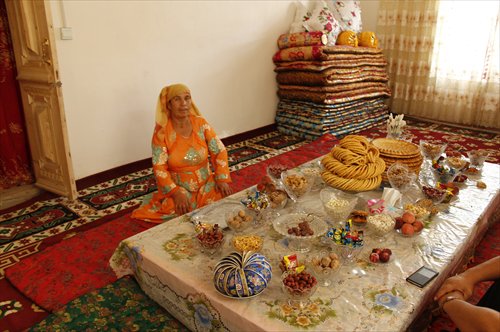 Amphibious armored vehicle unit conducts open sea drill
Amphibious armored vehicle unit conducts open sea drill
 Water relay in Henan
Water relay in Henan
 Ethnic culture feasts eyes of travelers
Ethnic culture feasts eyes of travelers
 80 security dogs assembled in Nanjing police dog training base
80 security dogs assembled in Nanjing police dog training base
 Graffiti artists paint on street walls in Xinjiang
Graffiti artists paint on street walls in Xinjiang
 Story of ceramic artist Zhang Lingyun
Story of ceramic artist Zhang Lingyun
 Magic summer night dream in Hongyuan
Magic summer night dream in Hongyuan
 Incredible creatures in headwaters drainage region of Lancang River
Incredible creatures in headwaters drainage region of Lancang River
 The future of rock n' roll seen in young rockers in China
The future of rock n' roll seen in young rockers in China
 Magnificent Yanziya Cliff
Magnificent Yanziya Cliff

Adili's wife in their renovated house in the old town of Kashgar near the Gaotai area (Photo/Global Times)
Criticism and doubts
Previously, when the local authorities firstly announced their renovation plans and launched a pilot project in Kashgar in 2009, some people misrepresented the government's intentions and said it was destroying the cultural heritage of the Uyghur people and forcing them to leave their ancestral land, He said, making it difficult for the local authorities to push forward the project.
Plus, due to a lack of publicity of the necessity and importance of the renovation work, local Uyghur people had little or no understanding of the governments' intentions. The project was halted.
In June 2009, a delegation group from the United Nations Educational, Scientific and Cultural Organization (UNESCO) visited the old city of Kashgar and offered a positive evaluation on the government's renovation work, saying "there are some aspects of the renovation of the old city worthy of promotion, such as the designation of the pilot area, encouraging residents to participate, and certain methods of building reinforcement."
Evaluations from UNESCO and consistent publicity work from local officials dispelled people's doubts.
In August 2010, eight departments and ministers, including the National Development and Reform Commission, the Ministry of Housing and Urban-Rural Development and the State Administration of Cultural Heritage, approved the renovation plan involving dilapidated houses in 28 districts, with Gaotai as one of them.
The total investment was around 7.05 billion yuan ($1.15 billion): 2 billion allocated by the central government in Beijing, 1 billion from the Xinjiang authorities and 226 million from the affordable housing construction subsidies.
Local residents need to provide the remaining 2.39 billion yuan.
More problems quickly arose. "Some villagers who were unwilling to pay the money came to us, saying they didn't want their houses renovated unless the authorities paid all the costs," He told the Global Times.
In order to encourage people to renovate, He said, he and his colleagues had to travel back and forth between the construction sites and the government buildings at least three times a day, dropping in on the residents to publicize the compensation policies and renovation regulations.
Local authorities encouraged local residents to dismantle and renovate their houses according to their own requirements.
"We don't adopt a 'one size fits all' style. We offer them money, compensation and construction teams. Each household can get compensation of 580 yuan per square meter, which can cover the basic renovation fee," He told the Global Times.
"They can choose their own designs and make any modifications until they are satisfied," He said.
To encourage people, local officials carried wads of compensation money to the homes of the Uyghur people after they started the renovation work.
"Residents were rallied to participate in the renovation work by themselves. They supported each other by helping others with the construction work," He said.
In a booklet that shows the appearance of the blocks before and after the renovation, an old man with white beard was shoveling while a young boy was carrying bricks.
"All the family members participated in the renovation, which is beneficial for the harmony of society," He said.
Now, walking in the outlying regions of the old town, you could mistake yourself as wandering in a picturesque city in the Middle East. Rows of two-storey houses, decorated by reliefs, statues and flowers and painted with different colors, are lined up alongside the road. The road is wider with a broad pavement.
Adili Mamat, 60, has lived in the region for decades. He was among the first batch of residents who agreed to renovate his dilapidated house. He started renovation in April 2013 and moved into the new house in October.
Adili has always dreamed of living in a new, beautiful house, though he had always lacked the money to do so.
After the renovation plan was publicized by local officials, Adili decided that he would sell his father-in-law's mud house in the downtown area at a price of 250,000 yuan, for the construction of the new house.
Now, the two-storey house with seven rooms, which cost him 870,000 yuan in total, can accommodate six family members.
To pay a loan of 70,000 yuan, Adili opened a grocery store and rented out three rooms on the first floor, from which he can earn nearly 40,000 yuan per year.
"Even though I have to pay the debts, I don't regret spending money on the renovation of the house. Nothing is more important than living in such a beautiful house," Adili told the Global Time, in his living room where the two-meter long tea table was covered with dishes of jujubes, a Xinjiang traditional food, and fruits.
 |
 Beautiful policewoman in an anti-terrorism SWAT team
Beautiful policewoman in an anti-terrorism SWAT team Cute photos of little Taoist nuns and monks go viral online
Cute photos of little Taoist nuns and monks go viral online Amphibious armored vehicle unit conducts open sea drill
Amphibious armored vehicle unit conducts open sea drill A post-90s girl who takes grandma to work
A post-90s girl who takes grandma to work Beijing policewomen posters become a hit
Beijing policewomen posters become a hit Armored regiment trains on the sea
Armored regiment trains on the sea Children spend 'Father's Day' with dads at work
Children spend 'Father's Day' with dads at work 'Pan Da' appear in Shanghai World Financial Center
'Pan Da' appear in Shanghai World Financial Center Champions take selfies on podium
Champions take selfies on podium The vanishing folk skills
The vanishing folk skills Intoxicating beauty of Dali, Yunnan province
Intoxicating beauty of Dali, Yunnan province Memorable moments of Ludian earthquake
Memorable moments of Ludian earthquake Bring world together to help elephant
Bring world together to help elephant 'Building Dreams'
'Building Dreams'  Labrang Monastery
Labrang MonasteryDay|Week|Month